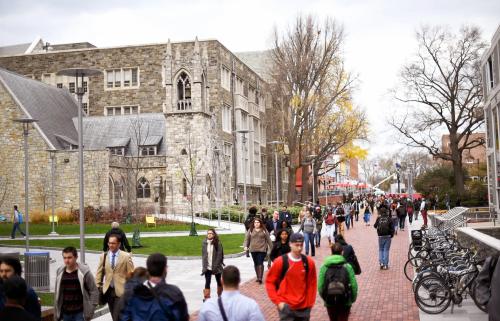The following oral testimony accompanied written testimony submitted to the House Higher Education and Workforce Development Subcommittee on July 27, 2023, for the “Lowering Costs and Increasing Value for Students, Institutions, and Taxpayers” hearing.
Chairman Owens, Ranking Member Wilson, and Members of the Committee, thank you for the opportunity to testify today.
For most students, getting a college education is one of the best investments they can make. Over a lifetime, the benefits of a college education—typically—far exceed the costs to students and taxpayers.
But for some students, the costs may exceed the benefits, especially if they do not complete their degree or if they attend programs that do not provide them with skills that are valued in the labor market.
If higher education was a well-functioning competitive market, poor-performing programs would be forced to close as students realize the programs’ low value. But the reality is that the market for higher education does not operate like other markets. It exhibits several types of market failure that make government intervention imperative for protecting students and taxpayers. Among the most important market failures, and the one I will focus on today, is imperfect information.
Institutions have more information on school quality, costs, and outcomes than prospective students. This imbalance is compounded by the fact that students have little way of knowing how well a program will meet their needs until after they have enrolled—and after they have taken on debt to attend. Unlike most other products, the benefits of higher education accrue far into the future, making them difficult for students to predict.
Prospective students face an array of complex choices, and these choices may be particularly challenging to navigate for students without a tradition of college-going in their community. Research shows that even very high-achieving low-income students find it difficult to digest the mountain of complex information on colleges to find the best match. And since most students pick a college only once or twice in their lives, they have few opportunities to practice and very little room for a mistake.
One market-based approach to solving problems of imperfect information is to simply provide more information to students. This approach is a necessary first step toward addressing information issues, and efforts to enhance data availability like the College Scorecard and the College Transparency Act are critically important. But a growing body of literature shows that information provision alone is not sufficient to protect students and taxpayers.
As I document in my written testimony, past releases of government-provided information, like the Scorecard, have had little or no impact on the choices of the students who need it most—nor have they reduced college costs. To ensure value for students and taxpayers, institutions must be held accountable for student outcomes with meaningful consequences for poor-performing programs.
In contrast to most other markets, the federal government has access to excellent data on student outcomes by which to measure value, and it has more expertise to interpret performance than the average student. It also has the tools, authority, and obligation to set a minimum standard of value for taxpayer-financed programs.
Legislators can address these market failures. First and foremost, the Department of Education’s proposed gainful employment (GE) regulations must be implemented. GE is critically important for improving accountability and fulfilling the Higher Education Act’s imperative to ensure that career-training programs lead to gainful employment.
The proposed GE Rule is well-targeted to hold accountable the programs that the data show are most likely to leave students with heavy debt burdens and low earnings. Nearly one-third of for-profit certificate programs would fail GE measures compared to just one percent of programs in community colleges.
For-profit institutions enroll disproportionate shares of low-income students, students of color, veterans, working students, and single parents, while typically charging higher tuition, relying more heavily on federal student aid, and generating worse student outcomes than other sectors. On average, earnings are lower—and debt is higher—in the for-profit sector than in others, so it’s not surprising that over half of for-profit borrowers default on their loans over 12 years.
New research shows that accountability systems, like GE, that sanction or close poor-performing for-profit colleges, do not reduce college access, but instead cause students to attend colleges with better outcomes.
Although poor student outcomes are concentrated in the for-profit sector, they are not confined to it. Accountability policy should be appropriately designed to address the risks of different types of programs. And should Congress move to expand Pell Grant eligibility to very short-term programs, any legislation must ensure that only the highest-performing programs are eligible to participate in this critical taxpayer-funded program.
Over the last two decades, a growing body of economic and policy research has generated new evidence on value in the market for higher education. Research has shown where the problems are concentrated, how students and institutions may be affected by various policy options, and which metrics might be most effective in measuring value. I am grateful for the opportunity to share this research with you, and I hope it will help with your efforts to ensure value in higher education for students and taxpayers.
The Brookings Institution is committed to quality, independence, and impact.
We are supported by a diverse array of funders. In line with our values and policies, each Brookings publication represents the sole views of its author(s).







Commentary
TestimonyTo ensure value for students and taxpayers, colleges must be held accountable for student outcomes
August 23, 2023